Analyzing Staffing Frameworks: CFB Company Case Study Report
VerifiedAdded on 2022/10/08
|7
|1570
|32
Report
AI Summary
This report analyzes the Chicago Food and Beverage (CFB) Company case study, focusing on its staffing framework and its impact on expatriate management and compensation. The report identifies the ethnocentric staffing system used by CFB, explaining its characteristics and advantag...
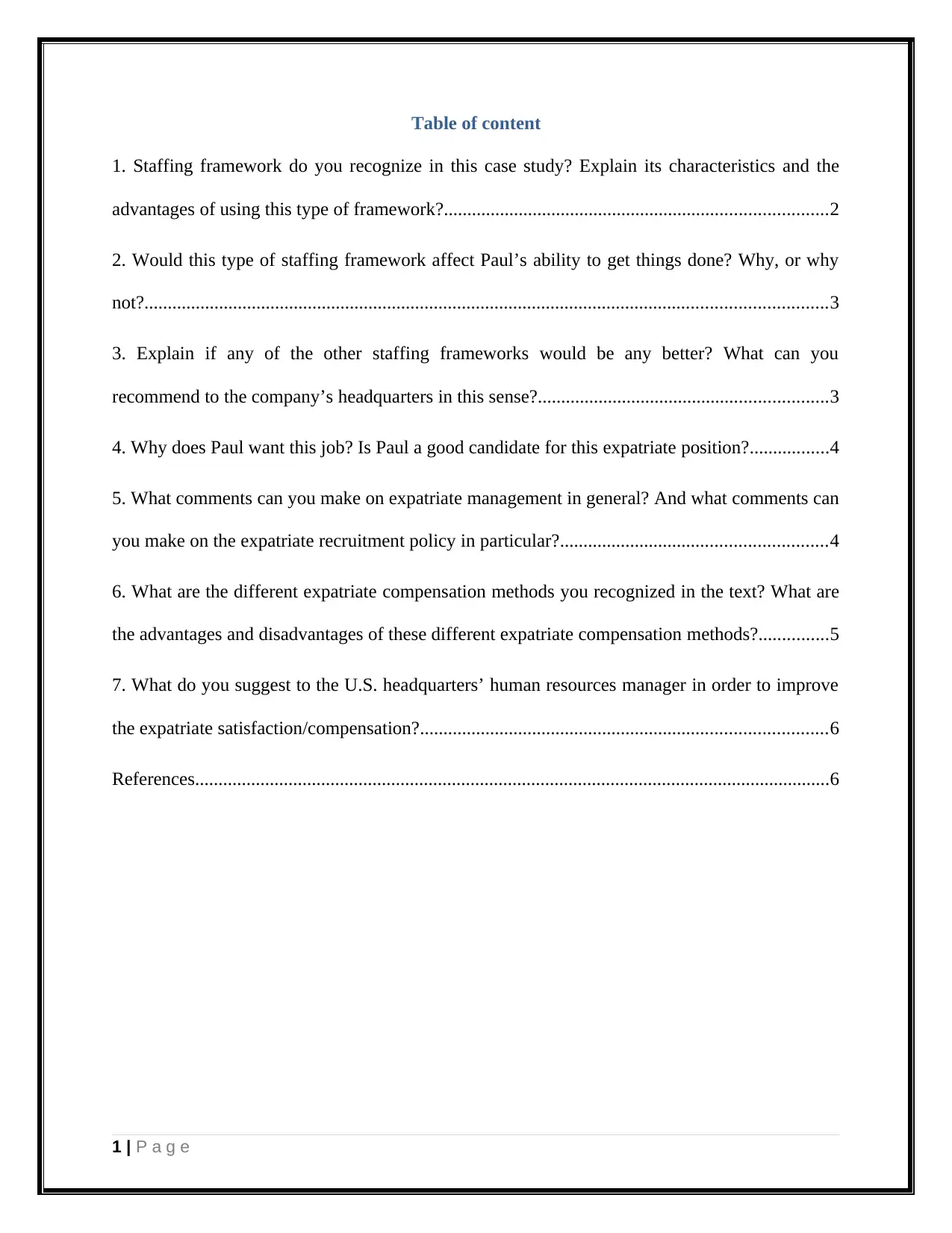
Table of content
1. Staffing framework do you recognize in this case study? Explain its characteristics and the
advantages of using this type of framework?..................................................................................2
2. Would this type of staffing framework affect Paul’s ability to get things done? Why, or why
not?..................................................................................................................................................3
3. Explain if any of the other staffing frameworks would be any better? What can you
recommend to the company’s headquarters in this sense?..............................................................3
4. Why does Paul want this job? Is Paul a good candidate for this expatriate position?.................4
5. What comments can you make on expatriate management in general? And what comments can
you make on the expatriate recruitment policy in particular?.........................................................4
6. What are the different expatriate compensation methods you recognized in the text? What are
the advantages and disadvantages of these different expatriate compensation methods?...............5
7. What do you suggest to the U.S. headquarters’ human resources manager in order to improve
the expatriate satisfaction/compensation?.......................................................................................6
References........................................................................................................................................6
1 | P a g e
1. Staffing framework do you recognize in this case study? Explain its characteristics and the
advantages of using this type of framework?..................................................................................2
2. Would this type of staffing framework affect Paul’s ability to get things done? Why, or why
not?..................................................................................................................................................3
3. Explain if any of the other staffing frameworks would be any better? What can you
recommend to the company’s headquarters in this sense?..............................................................3
4. Why does Paul want this job? Is Paul a good candidate for this expatriate position?.................4
5. What comments can you make on expatriate management in general? And what comments can
you make on the expatriate recruitment policy in particular?.........................................................4
6. What are the different expatriate compensation methods you recognized in the text? What are
the advantages and disadvantages of these different expatriate compensation methods?...............5
7. What do you suggest to the U.S. headquarters’ human resources manager in order to improve
the expatriate satisfaction/compensation?.......................................................................................6
References........................................................................................................................................6
1 | P a g e
Paraphrase This Document
Need a fresh take? Get an instant paraphrase of this document with our AI Paraphraser
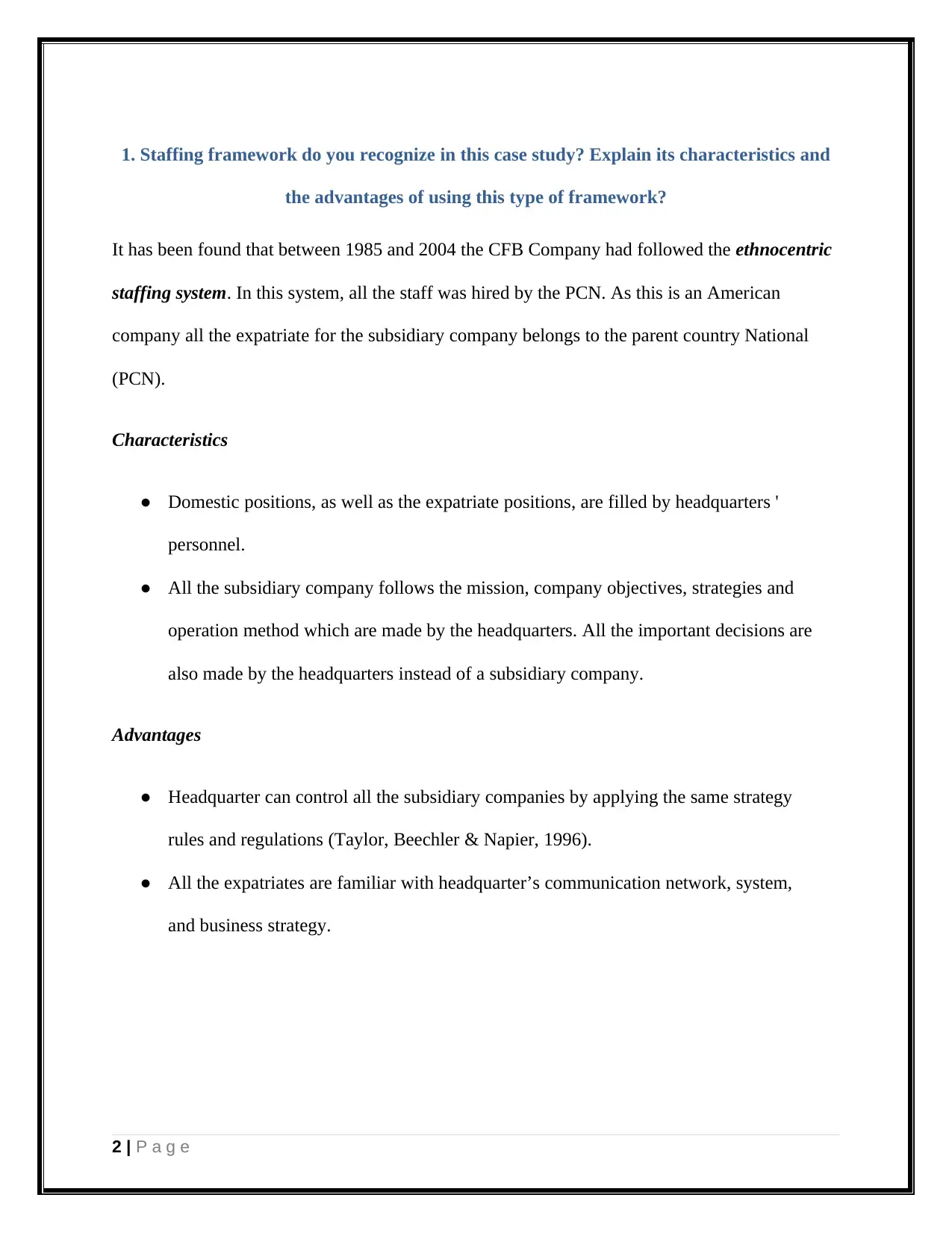
1. Staffing framework do you recognize in this case study? Explain its characteristics and
the advantages of using this type of framework?
It has been found that between 1985 and 2004 the CFB Company had followed the ethnocentric
staffing system. In this system, all the staff was hired by the PCN. As this is an American
company all the expatriate for the subsidiary company belongs to the parent country National
(PCN).
Characteristics
● Domestic positions, as well as the expatriate positions, are filled by headquarters '
personnel.
● All the subsidiary company follows the mission, company objectives, strategies and
operation method which are made by the headquarters. All the important decisions are
also made by the headquarters instead of a subsidiary company.
Advantages
● Headquarter can control all the subsidiary companies by applying the same strategy
rules and regulations (Taylor, Beechler & Napier, 1996).
● All the expatriates are familiar with headquarter’s communication network, system,
and business strategy.
2 | P a g e
the advantages of using this type of framework?
It has been found that between 1985 and 2004 the CFB Company had followed the ethnocentric
staffing system. In this system, all the staff was hired by the PCN. As this is an American
company all the expatriate for the subsidiary company belongs to the parent country National
(PCN).
Characteristics
● Domestic positions, as well as the expatriate positions, are filled by headquarters '
personnel.
● All the subsidiary company follows the mission, company objectives, strategies and
operation method which are made by the headquarters. All the important decisions are
also made by the headquarters instead of a subsidiary company.
Advantages
● Headquarter can control all the subsidiary companies by applying the same strategy
rules and regulations (Taylor, Beechler & Napier, 1996).
● All the expatriates are familiar with headquarter’s communication network, system,
and business strategy.
2 | P a g e
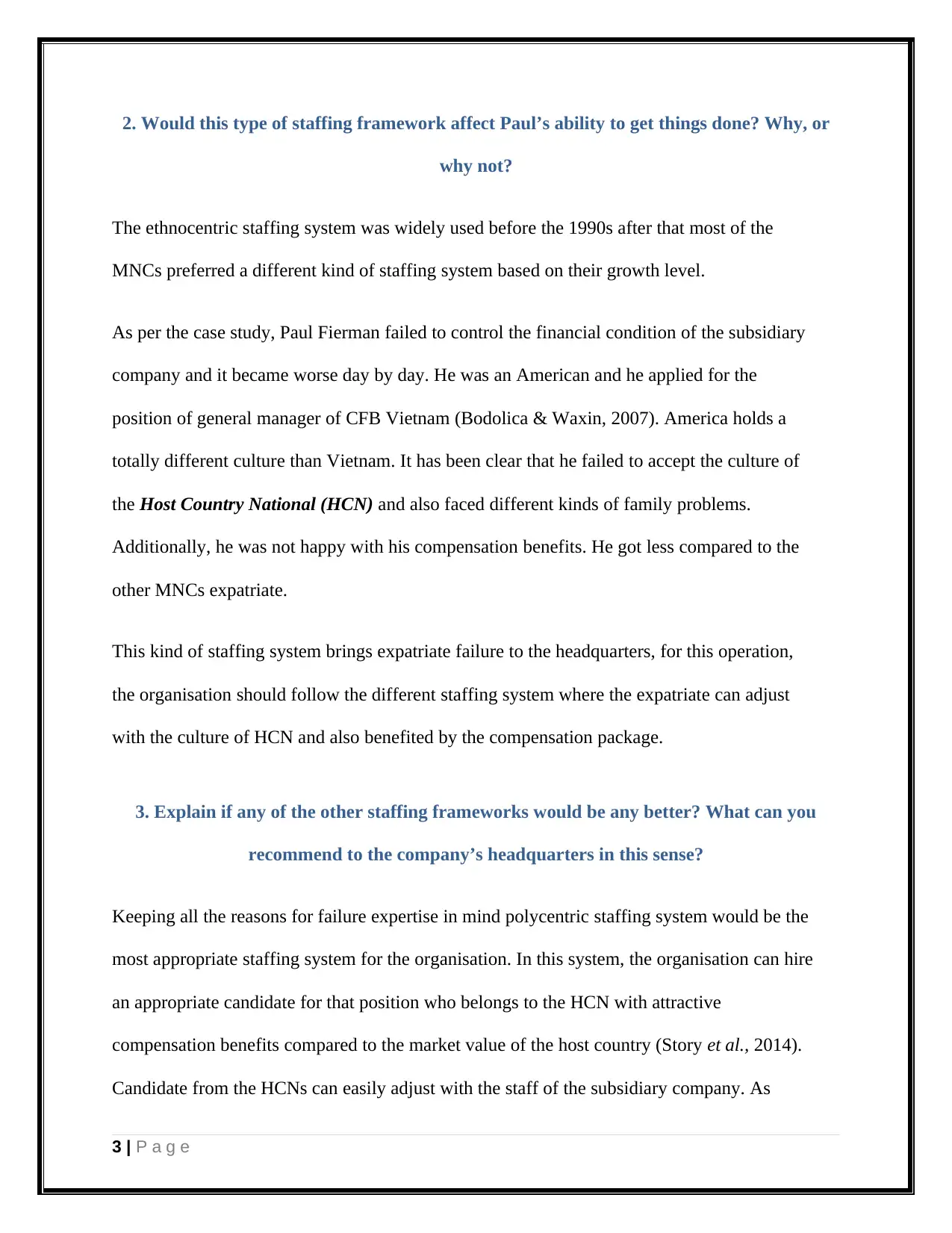
2. Would this type of staffing framework affect Paul’s ability to get things done? Why, or
why not?
The ethnocentric staffing system was widely used before the 1990s after that most of the
MNCs preferred a different kind of staffing system based on their growth level.
As per the case study, Paul Fierman failed to control the financial condition of the subsidiary
company and it became worse day by day. He was an American and he applied for the
position of general manager of CFB Vietnam (Bodolica & Waxin, 2007). America holds a
totally different culture than Vietnam. It has been clear that he failed to accept the culture of
the Host Country National (HCN) and also faced different kinds of family problems.
Additionally, he was not happy with his compensation benefits. He got less compared to the
other MNCs expatriate.
This kind of staffing system brings expatriate failure to the headquarters, for this operation,
the organisation should follow the different staffing system where the expatriate can adjust
with the culture of HCN and also benefited by the compensation package.
3. Explain if any of the other staffing frameworks would be any better? What can you
recommend to the company’s headquarters in this sense?
Keeping all the reasons for failure expertise in mind polycentric staffing system would be the
most appropriate staffing system for the organisation. In this system, the organisation can hire
an appropriate candidate for that position who belongs to the HCN with attractive
compensation benefits compared to the market value of the host country (Story et al., 2014).
Candidate from the HCNs can easily adjust with the staff of the subsidiary company. As
3 | P a g e
why not?
The ethnocentric staffing system was widely used before the 1990s after that most of the
MNCs preferred a different kind of staffing system based on their growth level.
As per the case study, Paul Fierman failed to control the financial condition of the subsidiary
company and it became worse day by day. He was an American and he applied for the
position of general manager of CFB Vietnam (Bodolica & Waxin, 2007). America holds a
totally different culture than Vietnam. It has been clear that he failed to accept the culture of
the Host Country National (HCN) and also faced different kinds of family problems.
Additionally, he was not happy with his compensation benefits. He got less compared to the
other MNCs expatriate.
This kind of staffing system brings expatriate failure to the headquarters, for this operation,
the organisation should follow the different staffing system where the expatriate can adjust
with the culture of HCN and also benefited by the compensation package.
3. Explain if any of the other staffing frameworks would be any better? What can you
recommend to the company’s headquarters in this sense?
Keeping all the reasons for failure expertise in mind polycentric staffing system would be the
most appropriate staffing system for the organisation. In this system, the organisation can hire
an appropriate candidate for that position who belongs to the HCN with attractive
compensation benefits compared to the market value of the host country (Story et al., 2014).
Candidate from the HCNs can easily adjust with the staff of the subsidiary company. As
3 | P a g e
You're viewing a preview
Unlock full access by subscribing today!
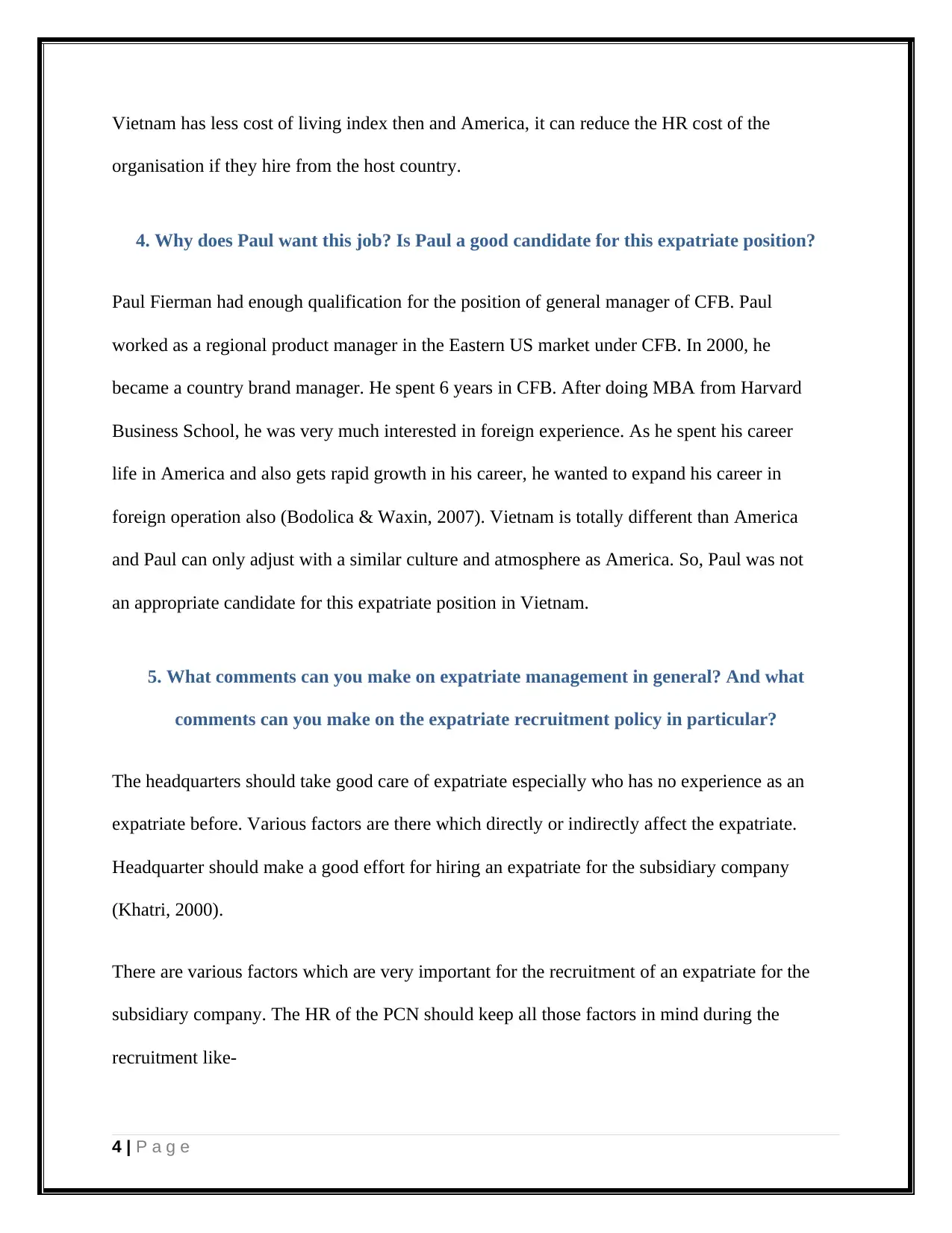
Vietnam has less cost of living index then and America, it can reduce the HR cost of the
organisation if they hire from the host country.
4. Why does Paul want this job? Is Paul a good candidate for this expatriate position?
Paul Fierman had enough qualification for the position of general manager of CFB. Paul
worked as a regional product manager in the Eastern US market under CFB. In 2000, he
became a country brand manager. He spent 6 years in CFB. After doing MBA from Harvard
Business School, he was very much interested in foreign experience. As he spent his career
life in America and also gets rapid growth in his career, he wanted to expand his career in
foreign operation also (Bodolica & Waxin, 2007). Vietnam is totally different than America
and Paul can only adjust with a similar culture and atmosphere as America. So, Paul was not
an appropriate candidate for this expatriate position in Vietnam.
5. What comments can you make on expatriate management in general? And what
comments can you make on the expatriate recruitment policy in particular?
The headquarters should take good care of expatriate especially who has no experience as an
expatriate before. Various factors are there which directly or indirectly affect the expatriate.
Headquarter should make a good effort for hiring an expatriate for the subsidiary company
(Khatri, 2000).
There are various factors which are very important for the recruitment of an expatriate for the
subsidiary company. The HR of the PCN should keep all those factors in mind during the
recruitment like-
4 | P a g e
organisation if they hire from the host country.
4. Why does Paul want this job? Is Paul a good candidate for this expatriate position?
Paul Fierman had enough qualification for the position of general manager of CFB. Paul
worked as a regional product manager in the Eastern US market under CFB. In 2000, he
became a country brand manager. He spent 6 years in CFB. After doing MBA from Harvard
Business School, he was very much interested in foreign experience. As he spent his career
life in America and also gets rapid growth in his career, he wanted to expand his career in
foreign operation also (Bodolica & Waxin, 2007). Vietnam is totally different than America
and Paul can only adjust with a similar culture and atmosphere as America. So, Paul was not
an appropriate candidate for this expatriate position in Vietnam.
5. What comments can you make on expatriate management in general? And what
comments can you make on the expatriate recruitment policy in particular?
The headquarters should take good care of expatriate especially who has no experience as an
expatriate before. Various factors are there which directly or indirectly affect the expatriate.
Headquarter should make a good effort for hiring an expatriate for the subsidiary company
(Khatri, 2000).
There are various factors which are very important for the recruitment of an expatriate for the
subsidiary company. The HR of the PCN should keep all those factors in mind during the
recruitment like-
4 | P a g e
Paraphrase This Document
Need a fresh take? Get an instant paraphrase of this document with our AI Paraphraser
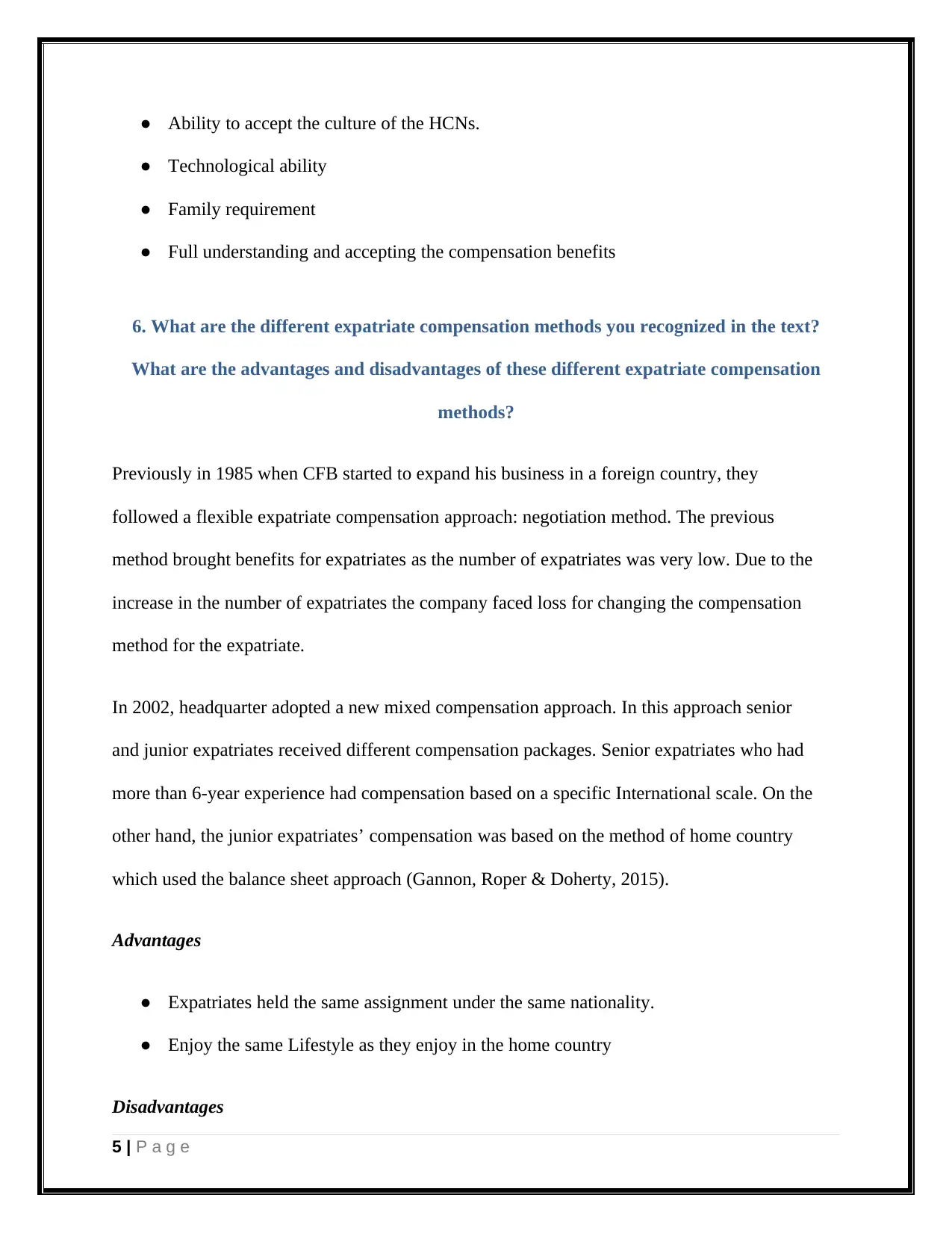
● Ability to accept the culture of the HCNs.
● Technological ability
● Family requirement
● Full understanding and accepting the compensation benefits
6. What are the different expatriate compensation methods you recognized in the text?
What are the advantages and disadvantages of these different expatriate compensation
methods?
Previously in 1985 when CFB started to expand his business in a foreign country, they
followed a flexible expatriate compensation approach: negotiation method. The previous
method brought benefits for expatriates as the number of expatriates was very low. Due to the
increase in the number of expatriates the company faced loss for changing the compensation
method for the expatriate.
In 2002, headquarter adopted a new mixed compensation approach. In this approach senior
and junior expatriates received different compensation packages. Senior expatriates who had
more than 6-year experience had compensation based on a specific International scale. On the
other hand, the junior expatriates’ compensation was based on the method of home country
which used the balance sheet approach (Gannon, Roper & Doherty, 2015).
Advantages
● Expatriates held the same assignment under the same nationality.
● Enjoy the same Lifestyle as they enjoy in the home country
Disadvantages
5 | P a g e
● Technological ability
● Family requirement
● Full understanding and accepting the compensation benefits
6. What are the different expatriate compensation methods you recognized in the text?
What are the advantages and disadvantages of these different expatriate compensation
methods?
Previously in 1985 when CFB started to expand his business in a foreign country, they
followed a flexible expatriate compensation approach: negotiation method. The previous
method brought benefits for expatriates as the number of expatriates was very low. Due to the
increase in the number of expatriates the company faced loss for changing the compensation
method for the expatriate.
In 2002, headquarter adopted a new mixed compensation approach. In this approach senior
and junior expatriates received different compensation packages. Senior expatriates who had
more than 6-year experience had compensation based on a specific International scale. On the
other hand, the junior expatriates’ compensation was based on the method of home country
which used the balance sheet approach (Gannon, Roper & Doherty, 2015).
Advantages
● Expatriates held the same assignment under the same nationality.
● Enjoy the same Lifestyle as they enjoy in the home country
Disadvantages
5 | P a g e
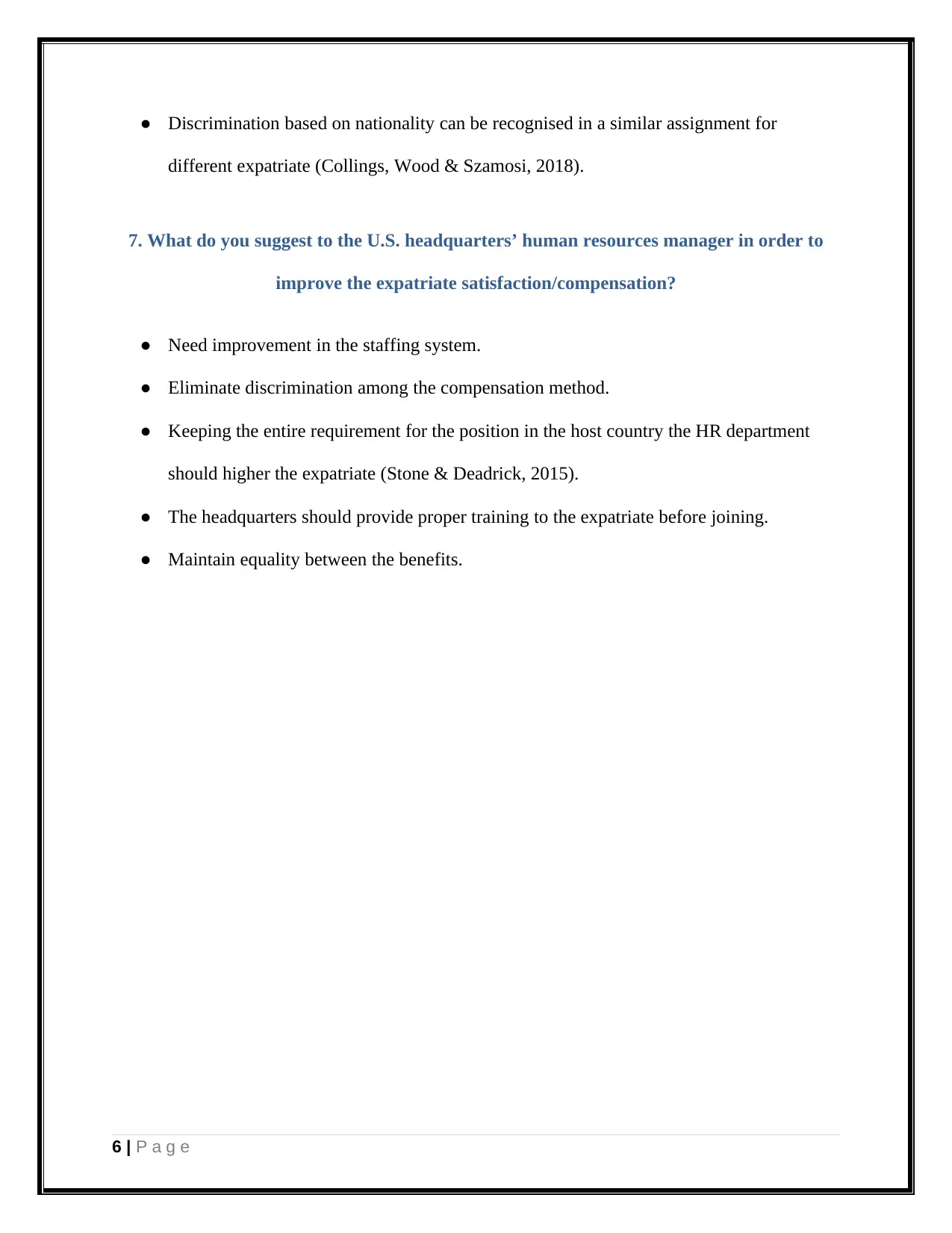
● Discrimination based on nationality can be recognised in a similar assignment for
different expatriate (Collings, Wood & Szamosi, 2018).
7. What do you suggest to the U.S. headquarters’ human resources manager in order to
improve the expatriate satisfaction/compensation?
● Need improvement in the staffing system.
● Eliminate discrimination among the compensation method.
● Keeping the entire requirement for the position in the host country the HR department
should higher the expatriate (Stone & Deadrick, 2015).
● The headquarters should provide proper training to the expatriate before joining.
● Maintain equality between the benefits.
6 | P a g e
different expatriate (Collings, Wood & Szamosi, 2018).
7. What do you suggest to the U.S. headquarters’ human resources manager in order to
improve the expatriate satisfaction/compensation?
● Need improvement in the staffing system.
● Eliminate discrimination among the compensation method.
● Keeping the entire requirement for the position in the host country the HR department
should higher the expatriate (Stone & Deadrick, 2015).
● The headquarters should provide proper training to the expatriate before joining.
● Maintain equality between the benefits.
6 | P a g e
You're viewing a preview
Unlock full access by subscribing today!
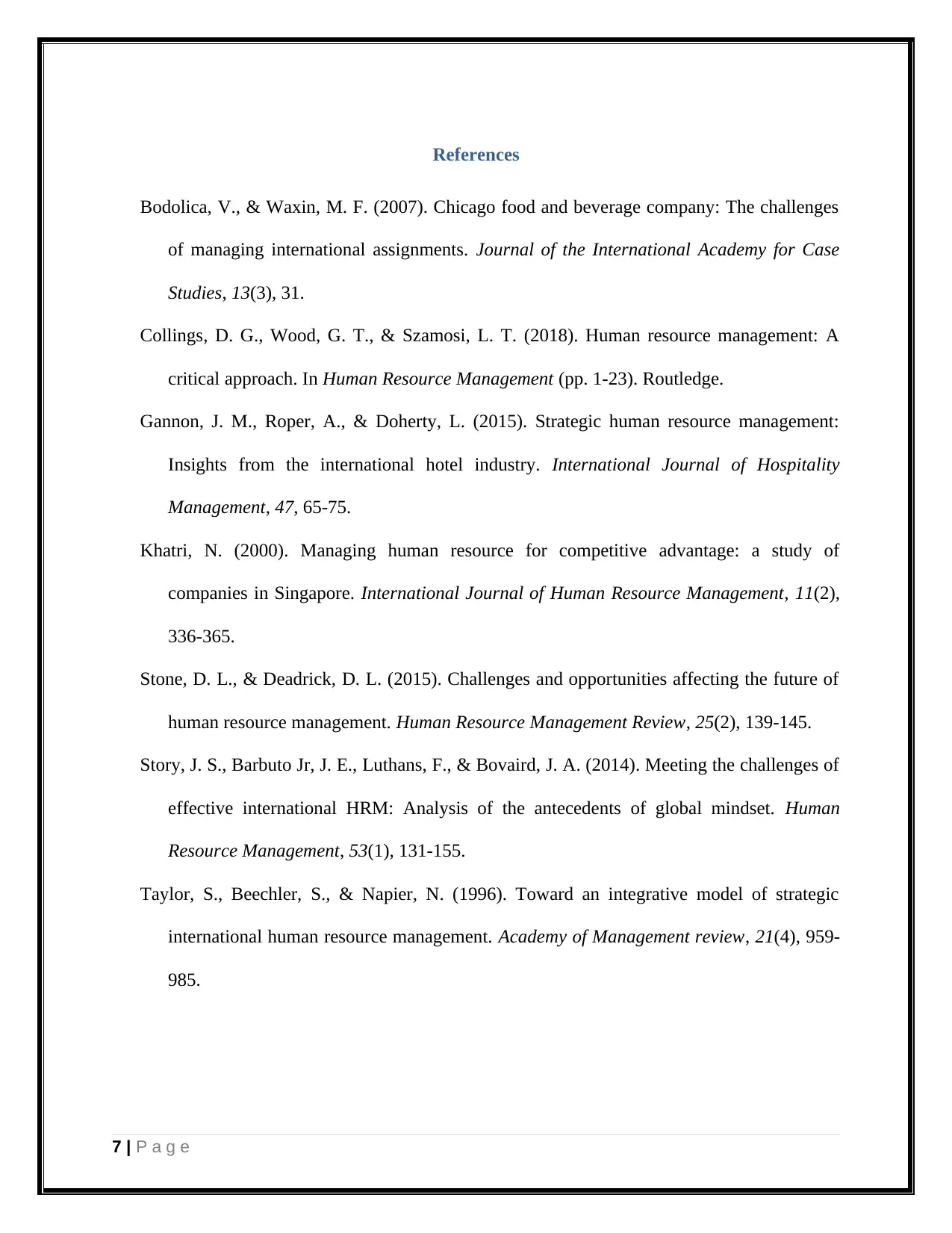
References
Bodolica, V., & Waxin, M. F. (2007). Chicago food and beverage company: The challenges
of managing international assignments. Journal of the International Academy for Case
Studies, 13(3), 31.
Collings, D. G., Wood, G. T., & Szamosi, L. T. (2018). Human resource management: A
critical approach. In Human Resource Management (pp. 1-23). Routledge.
Gannon, J. M., Roper, A., & Doherty, L. (2015). Strategic human resource management:
Insights from the international hotel industry. International Journal of Hospitality
Management, 47, 65-75.
Khatri, N. (2000). Managing human resource for competitive advantage: a study of
companies in Singapore. International Journal of Human Resource Management, 11(2),
336-365.
Stone, D. L., & Deadrick, D. L. (2015). Challenges and opportunities affecting the future of
human resource management. Human Resource Management Review, 25(2), 139-145.
Story, J. S., Barbuto Jr, J. E., Luthans, F., & Bovaird, J. A. (2014). Meeting the challenges of
effective international HRM: Analysis of the antecedents of global mindset. Human
Resource Management, 53(1), 131-155.
Taylor, S., Beechler, S., & Napier, N. (1996). Toward an integrative model of strategic
international human resource management. Academy of Management review, 21(4), 959-
985.
7 | P a g e
Bodolica, V., & Waxin, M. F. (2007). Chicago food and beverage company: The challenges
of managing international assignments. Journal of the International Academy for Case
Studies, 13(3), 31.
Collings, D. G., Wood, G. T., & Szamosi, L. T. (2018). Human resource management: A
critical approach. In Human Resource Management (pp. 1-23). Routledge.
Gannon, J. M., Roper, A., & Doherty, L. (2015). Strategic human resource management:
Insights from the international hotel industry. International Journal of Hospitality
Management, 47, 65-75.
Khatri, N. (2000). Managing human resource for competitive advantage: a study of
companies in Singapore. International Journal of Human Resource Management, 11(2),
336-365.
Stone, D. L., & Deadrick, D. L. (2015). Challenges and opportunities affecting the future of
human resource management. Human Resource Management Review, 25(2), 139-145.
Story, J. S., Barbuto Jr, J. E., Luthans, F., & Bovaird, J. A. (2014). Meeting the challenges of
effective international HRM: Analysis of the antecedents of global mindset. Human
Resource Management, 53(1), 131-155.
Taylor, S., Beechler, S., & Napier, N. (1996). Toward an integrative model of strategic
international human resource management. Academy of Management review, 21(4), 959-
985.
7 | P a g e
1 out of 7
Your All-in-One AI-Powered Toolkit for Academic Success.
+13062052269
info@desklib.com
Available 24*7 on WhatsApp / Email
![[object Object]](/_next/static/media/star-bottom.7253800d.svg)
Unlock your academic potential
© 2024 | Zucol Services PVT LTD | All rights reserved.
